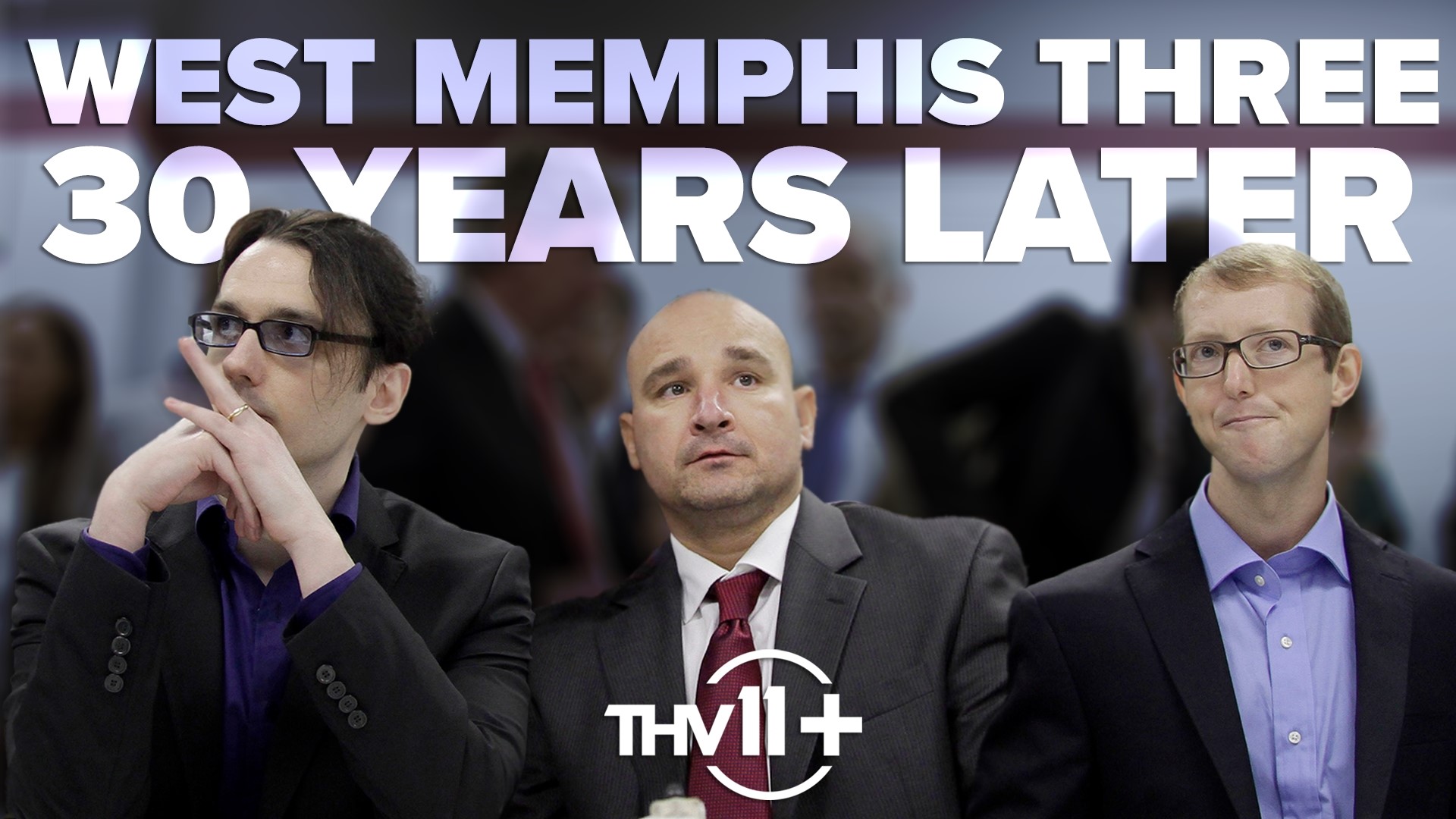The West Memphis Three and 30 years fighting to prove their innocence
30 years ago, Christopher, Michael, and Steve were found dead. Police pinpointed three teens as the killers and thus began a long effort to prove their innocence.

On the night of May 5, 1993, John Mark Byers reported three boys missing and the next day the bodies of Steve Branch, Michael Moore, and Christopher Byers were found in a ditch.
Now 30 years later, we look at the case, those that continue to prove the fight for DNA testing, and what will happen next.
The West Memphis Murders
The infamous West Memphis murders of three 8-year-old boys rocked not just the Arkansas town at the border of Tennessee, but gripped an entire nation.
In 1993, it was a time when kids rode their bikes everywhere and many parents didn't worry where they were.
But in one day that all changed for a small tightknit community.
It was the morning of May 5, 1993, when Steve, Michael, and Christopher went to school.
Neighbors who saw them said they were playing with each other into the evening before Terry Hobbs, Steve Branch's stepfather, called them to come in for the night.
The three boys never came home.
Those were the last moments of what was a normal day for the little town.
Police and residents searched for them throughout the night and into the next day. The search ended when their bodies were found in a nearby ditch on the afternoon of May 6.
A police officer at the time told reporters the three boys were found submerged in water. They were stripped naked and hogtied with their own shoelaces.
He said it wasn't an accident and it was a homicide. Autopsies later revealed they died due to multiple injuries.
The West Memphis community was shocked.
"I can't even see how somebody would do something like that, because if it was my kid I'd kill them," a mother picking up her daughter school at the time said. "He would be dead right now."
Her daughter was a classmate to the three boys. She said students decorated their desks. She was sad about the loss of her friend, Steve, who helped her with homework.
The West Memphis Three
It wasn't long before police honed on three teens known to law enforcement for petty crime.
They were Damien Echols, Jason Baldwin, and Jessie Misskelley.
The teens went to trial, with prosecutors claiming they had evidence to convict them.
"There was no evidence, absolutely no evidence, linking them to the crime," said Lonnie Soury, a member of Echols' legal team.
The three were found guilty of the murder. Misskelley and Baldwin were sentenced to life in prison. Echols was sent to death row.
"These kids didn't drive. The three bodies, bizarrely had no blood around them, so clearly, they were taken from the murder scene to this drainage ditch," Soury said. "It was an incredible miscarriage of justice."
For the next 18 years and 78 days, the three accused would spend their life behind bars.
But they continued to have their case tried again in front of a judge. Attorneys would argue there was strong doubts on the evidence pointing to them as the killers.
The prosecutor and attorneys of the West Memphis Three made a deal called an Alford Plea. It allowed the three to plead guilty and still maintain their innocence.
"That's not justice no matter how you look at it," Baldwin said, years after being release. "They're still not really trying to find those boys' [killer]."
On August 19, 2011, the three were released from prison maintaining innocence, but still guilty.
Notoriety in the 21st Century
While the three were jailed, the internet continued to grow along with the transformation of American culture.
The mid-90s brought grunge and counterculture to the forefront, giving people new ways to express themselves outside the norm.
It was on the internet where many could find people and explore topics like never before. Web forums and discussion boards was one part in the growing notoriety of the West Memphis Three's case came during a unique time in history.
That passion online branched out to nationwide interest, soon becoming the focus of documentaries that raised questions and concern about the verdict.
Three years after the murders in West Memphis, a new documentary would take an in-depth look at the case which captivated the country.
"Paradise Lost: The Child Murders at Robin Hood Hills" showcased several issues in the case that created doubt in the evidence. The trial became a national phenomenon and would later spawn two more documentaries on the case.
Then in 2007, the "Free the West Memphis Three" movement revived interest. People saw support for them from celebrities, like Natalie Maines of The Chicks and more.
True Crime in the Digital Age
But over a decade after their release from prison, the attention surrounding the West Memphis Three is getting new life yet again.
"There are people who weren't alive in 1993, who are on TikTok, or on social media and learning about it now and say, 'What is going on here,''' said Gillian Pensavalle.
Pensavalle is the creator of "True Crime Obsessed" podcast. It's cases like the West Memphis Three that made her want to bring attention to how the justice system can be flawed.
"It was just it was so shocking. It's one of those things where you realize like, oh, the the system is completely broken," said Pensavalle.
Thousands of people tune in to listen to each episode, and brings new attention and a new audience to the West Memphis Three's story.
Bob Ruff is the host to another podcast: "Truth & Justice."
He covers murder cases and highlights a small portion of the case or a particular piece of evidence.
He then posts documents to his website for people to look at the findings themselves. From there, he gets feedback and publishes a follow up episode with the discussion.
Ruff has done multiple seasons of the West Memphis Three case. For him, it's about finding the missing piece that would clear the name of Damien, Jessie, and Jason.
"That's why they kind of become high profile, because people like me, other podcasters, and documentarians cover them; but the reason they become newsworthy is because the district attorneys won't allow anyone to find the truth," said Ruff.
With these podcasts and the ability to have information at your fingertips, there's a global revival happening to find out what happened to Steve, Christopher, and Michael; and finally close what some say is an unfinished investigation.
The Continuing Legal Battle
It wasn't only the podcasts drawing new attention to the case that brought about new life, but in a major turn, the discovery of evidence that could lead to groundbreaking information.
"We're looking for the real killers. It's not only to exonerate Damien, Jason and Jesse, but find the real killers," said Lonnie Soury, a member of Echols' legal team.
In 2021, Echols' lawyers finally got the chance to move the case forward with renewed hope.
Echols' team combed through evidence that the state had previously told them was destroyed in a fire.
"We went into the police department and found the evidence packaged, beautifully packaged [and] preserved in excellent condition," Soury said.
The evidence was the original shoelaces used to tie up the boys during the crime. Echols' lawyers want to test them with new technology called an M-VAC machine that would extract DNA in smaller amounts.
The hope was that this evidence could show who was at the crime scene and who possibly killed the three boys in May 1993.
Echols' attorneys say former prosecutor Scott Ellington with the state judicial district told them that if new evidence was uncovered, they would be able to retest it. However, by the time the discovery happened, Ellington was no longer the prosecutor and the new one wasn't so willing to allow that.
So, Echols and his team went to court again fighting to get the evidence retested.
In June 2022, the judge said no. The ruling was that Echols' petition did not apply to him because he was not in state custody.
"We have a way in our hands where they can see who killed those children and they're refusing to do anything about it," said Echols after the ruling.
Echols finds himself in a familiar situation once more. One he had to do years ago when pleading his innocence to be freed from prison.
He hopes to go before the Arkansas Supreme Court to have them rule on whether he and his lawyers can proceed.
It's up to the court whether to hear the case and that timeline is uncertain.
If the justices do, they will decide whether or not that evidence should be retested.
It's a decision many believe could help bring a close to this 30-year saga and closure to the families of Christopher, Michael, and Steve, as well as, Damien, Jason, and Jessie.


